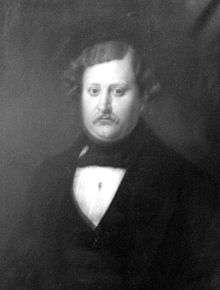Emmanuel Boyer de Fonscolombe
| Emmanuel Boyer de Fonscolombe | |
|---|---|
 | |
| Born |
1810 Aix-en-Provence, Bouches-du-Rhône, Provence-Alpes-Côte d'Azur, France |
| Died |
1875 Aix-en-Provence, Bouches-du-Rhône, Provence-Alpes-Côte d'Azur, France |
| Nationality | French |
| Occupation | Composer |
| Children |
Charles Henri Boyer de Fonscolombe Fernand Hippolyte Boyer de Fonscolombe |
| Parent(s) |
Charles Boyer de Fonscolombe Emilie de Cotto |
Emmanuel Boyer de Fonscolombe (1810–1875) was a French aristocrat and composer.
Biography
Early life
Emmanuel Boyer de Fonscolombe was born on October 27, 1810 in Aix-en-Provence.[1][2] The Boyer de Fonscolombe family became an aristocratic family with his paternal great-great-grandfather Honoré Boyer de Fonscolombe (1683–1743), who served as Secretary to King Louis XV of France (1710–1774).[2][3] His father was Charles Boyer de Fonscolombe (1778–1838) and his mother, Emilie de Cotto (1790-unknown).[2] He had two brothers, Philippe and Ludovic.[3] Gabriel-Barthélemy de Magneval (1751–1821) was his grandfather.
Career
He was trained as a lawyer, and was an amateur entomologist and botanist.[1]
He became a renowned music composer.[4] He wrote an opera, Un Prisonnier en Crimée.[1] He also composed motets, melodies for Roman Catholic Masses, etc.[1] He served as a chapel master in the Église de la Madeleine in Aix.[1] He was friends with composer Félicien David (1810–1876), who honoured him with two of his songs: "Eden and Moïse au Sinaï.[1]
He was made a hereditary Baron by Emperor Napoleon III (1808–1873) on August 1, 1864.[1]
Personal life

He was married to Anne Salavy, daughter of Jacques-Henri Salavy and granddaughter of politician Jean-Honoré Salavy (1749–1823).[3] They had two sons:
- Charles Henri Boyer de Fonscolombe (1838–1907).[2] He married Alice de Romanet de Lestrange (1847–1933), daughter of Théodore de Romanet de Lestrange (1823–1900) and Caroline de Lestrange (1824–1905). They had a son and a daughter:
- Emmanuel Boyer de Fonscolombe de la Môle (1874-unknown).[2] He married Yvonne Gavoty (1883–1965), daughter of Charles Gavoty (1843–1930) and Delphine Jacques (1856–1928).[2] They had a daughter and a son:
- Marie Boyer de Fonscolombe de la Môle (1875–1972).[2] She married Jean Marc Martin de Saint-Exupéry (1863–1904), the son of Jean Louis Fernand de Saint-Exupéry (1833–1919) and Alix Elisabeth Blouquier de Trélan (1843–1906).[2] They had five children:
- Magdeleine de Saint-Exupéry (1897–1926).[2]
- Simone de Saint-Exupéry (1898–1978).[2]
- Antoine de Saint-Exupéry (1900–1944).[2] He was an aviator and the author of The Little Prince.[1]
- François de Saint-Exupéry (1902–1917).[2]
- Gabrielle de Saint-Exupéry (1903–1986).[2]
- Fernand Hippolyte Boyer de Fonscolombe (1841-unknown).[2]
He resided with his family in the Château de La Môle, a castle in La Môle belonging to the Boyer de Fonscolombe family since 1770.[4][5] They also lived in a family hôtel particulier in Aix-en-Provence: the Hôtel Boyer de Fonscolombe, now listed as a monument historique, located at 21 rue Gaston de Saporta.
He died in 1875 in Aix-en-Provence.[1][2]
References
- 1 2 3 4 5 6 7 8 9 Official website: Emmanuel de Fonscolombe
- 1 2 3 4 5 6 7 8 9 10 11 12 13 14 15 16 17 18 GeneaNet
- 1 2 3 Nicolas-Jules-Henri Gourdon de Genouillac, Albert-Dieudonné-Louis-Fidèle-Emmanuel Piolenc (1863). Nobiliaire du Département des Bouches-du-Rhône: histoire, généalogies. p. 56.
- 1 2 Dominique Auzias, Dominique Auzias, Jean-Paul Labourdette (2012). Golfe de Saint Tropez 2012 (avec cartes, photos + avis des lecteurs).
- ↑ Château de La Môle
|